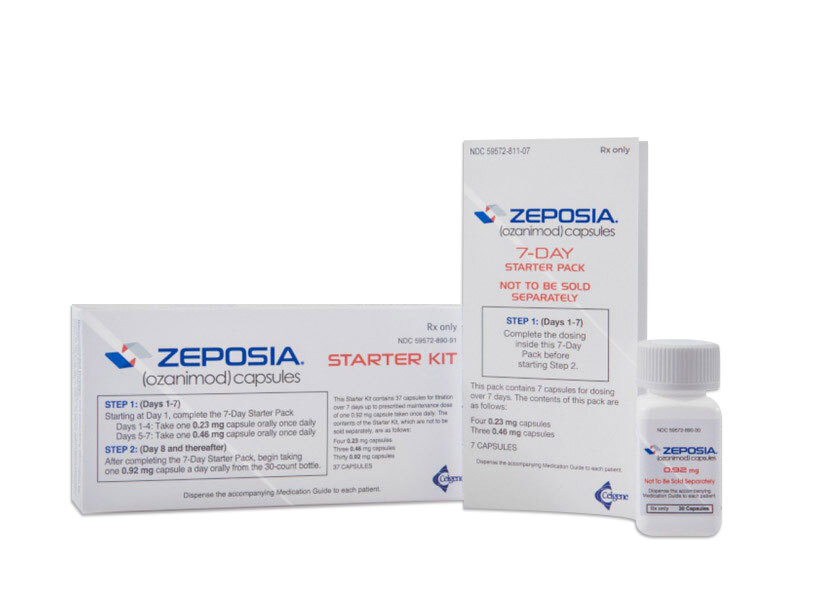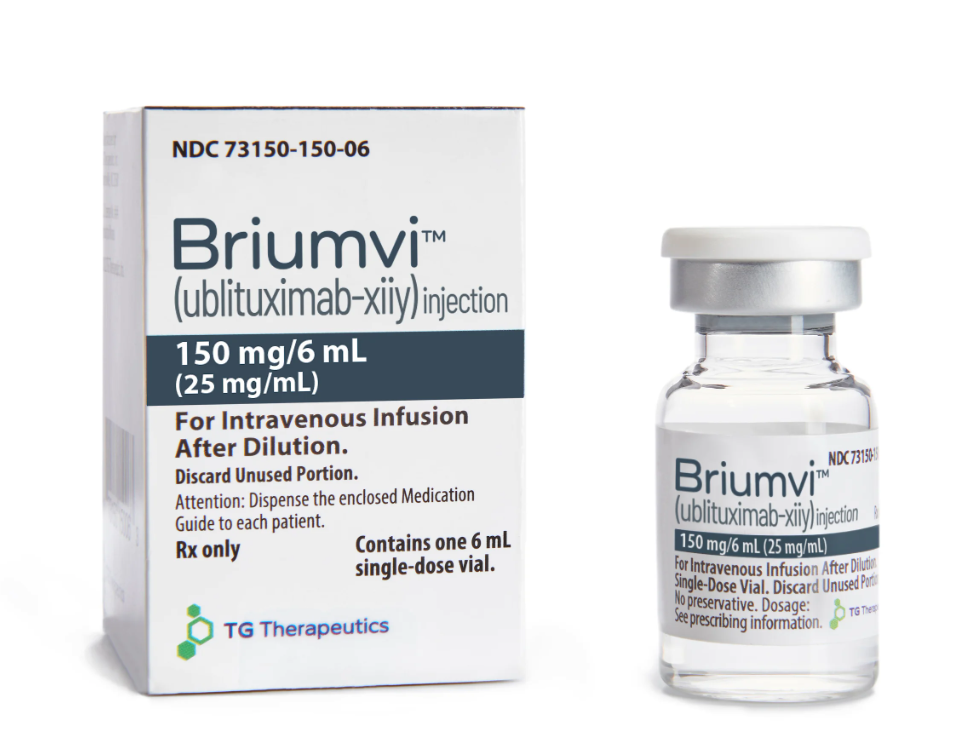Zeposia (ozanimod) vs Briumvi (ublituximab-xiiy)
Zeposia (ozanimod) vs Briumvi (ublituximab-xiiy)
Zeposia (ozanimod) is an oral sphingosine 1-phosphate receptor modulator indicated for the treatment of relapsing forms of multiple sclerosis (MS), which works by trapping immune cells in lymph nodes, reducing their migration to the central nervous system. Briumvi (ublituximab-xiiy), on the other hand, is an intravenous monoclonal antibody that selectively targets and depletes CD20-positive B cells, which are believed to play a key role in the pathogenesis of MS. When deciding between the two, patients should consider factors such as the route of administration, the frequency of dosing, potential side effects, and their own lifestyle and preference, in consultation with their healthcare provider.
Difference between Zeposia and Briumvi
| Metric | Zeposia (ozanimod) | Briumvi (ublituximab-xiiy) |
|---|---|---|
| Generic name | Ozanimod | Ublituximab-xiiy |
| Indications | Multiple sclerosis | Relapsing forms of multiple sclerosis |
| Mechanism of action | Sphingosine 1-phosphate receptor modulator | CD20-directed cytolytic antibody |
| Brand names | Zeposia | Briumvi |
| Administrative route | Oral | Intravenous |
| Side effects | Upper respiratory infection, liver enzyme elevation, orthostatic hypotension | Infusion reactions, infections, diarrhea, leukopenia, neutropenia, fatigue |
| Contraindications | Recent myocardial infarction, unstable angina, stroke, transient ischemic attack, decompensated heart failure | None known |
| Drug class | Immunomodulatory agent | Monoclonal antibody |
| Manufacturer | Bristol Myers Squibb | TG Therapeutics |
Efficacy
Zeposia (Ozanimod) Efficacy in Multiple Sclerosis
Zeposia (ozanimod) is an oral medication approved by the U.S. Food and Drug Administration (FDA) for the treatment of relapsing forms of multiple sclerosis (MS), which include clinically isolated syndrome, relapsing-remitting disease, and active secondary progressive disease, in adults. As a sphingosine 1-phosphate receptor modulator, Zeposia works by trapping certain white blood cells in lymph nodes, thus preventing them from reaching the central nervous system where they could cause damage. Clinical trials have demonstrated that Zeposia can significantly reduce the annual relapse rate in patients with relapsing forms of MS compared to a placebo. Furthermore, it has been shown to slow down the progression of physical disability and reduce the number of brain lesions detected by MRI scans, which are common in individuals with MS.
Briumvi (Ublituximab-xiiy) Efficacy in Multiple Sclerosis
Briumvi (ublituximab-xiiy) is a monoclonal antibody that has been studied for its efficacy in treating multiple sclerosis, although as of the knowledge cutoff date, it has not yet received FDA approval for this indication. In clinical trials for relapsing forms of MS, Briumvi has been evaluated for its ability to deplete CD20-positive B cells, which are believed to play a role in the pathogenesis of MS. The trials have indicated that Briumvi may significantly reduce annual relapse rates in patients with relapsing forms of the disease. Additionally, it has shown potential in reducing the number of T1 gadolinium-enhancing lesions and new or enlarging T2 lesions as seen on MRI scans, which are indicative of disease activity in MS patients.
Comparative Efficacy in Clinical Trials
When comparing the efficacy of Zeposia and Briumvi in clinical trials, it is important to consider that the two drugs have different mechanisms of action and may be studied in different patient populations. Zeposia has been approved based on its demonstrated efficacy in reducing relapse rates and disease progression in relapsing forms of MS. Briumvi, while showing promise in clinical trials, is still under investigation and awaiting approval. Its efficacy has also been measured in terms of relapse rate reduction and MRI lesion changes. The direct comparison of efficacy between the two drugs would require head-to-head clinical trials, which, to the best of the current knowledge, have not been conducted.
Conclusion
Both Zeposia and Briumvi have shown efficacy in the treatment of relapsing forms of multiple sclerosis through clinical trials. Zeposia, as an FDA-approved medication, offers a treatment option for MS patients with its ability to reduce relapses and slow disease progression. Briumvi's potential efficacy in MS is based on clinical trial data, and its approval status may change as further research is conducted and reviewed by regulatory agencies. Patients with MS should consult with their healthcare providers to understand the best treatment options for their individual condition, taking into account the efficacy, safety, and mechanism of action of the available medications.
Regulatory Agency Approvals
Zeposia
-
European Medical Agency (EMA), European Union

-
Food and Drug Administration (FDA), USA

-
Health Canada

-
Therapeutic Goods Administration (TGA), Australia

Briumvi
-
European Medical Agency (EMA), European Union

-
Food and Drug Administration (FDA), USA

Access Zeposia or Briumvi today
If Zeposia or Briumvi are not approved or available in your country (e.g. due to supply issues), you can access them via Everyone.org.
How it works

Make an enquiry
Choose the medicine you want to buy, answer a couple of questions, and upload your prescription to speed things up. We’ll get back to you within 24 hours.


Make an enquiry
Choose the medicine you want to buy, answer a couple of questions, and upload your prescription to speed things up. We’ll get back to you within 24 hours.


Breeze through the paperwork
We'll guide you through the required documents for importing unapproved medicine, ensuring you have all the necessary information.


Get a personalized quote
We’ll prepare a quote for you, including medicine costs and any shipping, administrative, or import fees that may apply.


Receive your medicine
Accept the quote and we’ll handle the rest - sourcing and safely delivering your medicine.

Some text on this page has been automatically generated. Speak to your physician before you start a new treatment or medication.
Let's talk
If you have any questions, call us or send us a message through WhatsApp or email:
Contact us




